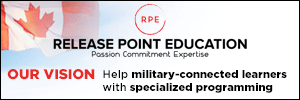Undergraduate students brought coding robots, internet knowledge and safety, photo editing, algorithms and more to classrooms in Kamloops all in an effort to boost digital literacy in youth.
Several TRU Science students developed and delivered hands-on coding workshops to 5,700 students in local elementary schools over the past nine months. This initiative, dubbed CanCODE, was born from a partnership with TRU's EUReKA Science program, TRU Computer Science faculty member Kevin O'Neil, and Kamloops-Thompson School District No. 73 technology co-ordinator Elizabeth Devries. A $100,000 grant from ACTUA allowed TRU to purchase equipment, facilitate CanCODE and hire students Adam Swanson, Lorelei Guidos, Shelby Toews, and Devin Martin.
"The digital literacy that the government has made a priority does not mean kids should solely use and consume technology. We need to actually teach them how to develop and create with it. The goal is to not for them to add a filter on Instagram, but for instructors come in and teach them how to manipulate software to generate something new," said Will Primrose, EUReKA Science program director.
Elementary students weren't the only captive audience members.
"Even teachers were very hands-on with the workshops. Many of the skills we were sharing are interesting and useful to everyone not just children," Martin said.
Switching up their roles as university students for time in front of the classroom has been invaluable for the instructors involved in this project.
"To be honest, I wasn't initially interested in a work term or co-op. But, I was recruited by my friend and encouraged by Kevin O'Neil. This helped me build confidence in my teaching and public speaking skills. I know I'll be able to apply these skills in my future," Toews said.
For Guidos, knowing how far she's come since day one as a science student, inspired her to help children learn more early on.
"Before I started studying engineering here, all I could do was turn on a computer and open a word document! I started to realize how much you can do with computers and how important it is that people learn as much as possible about them," she said. "This opportunity sparked something in me because this was my chance to give these kids the important experience of learning more about computers."
Community outreach and bringing digital literacy to children was always top-of-mind for organizers.
"We have an awesome technology camp program at TRU. As long as youth can make it here, they can participate. But, if transportation to our camp is a problem, certain youth don't have that same chance to participate. When this opportunity arose, we were able to start delivering technology to youth in the community," Primrose added.
Swanson was the first student hired as a coordinator. He researched, developed and later delivered curriculum with guidance from O'Neil. Guidos was hired shortly after to run workshops and further develop curriculum. Toews and Martin were hired to expand the curriculum and deliver workshops with an emphasis on reaching under-represented youth in the community. The duo taught Indigenous and immigrant youth and students facing socio-economic barriers. Primrose was highly involved during the planning and consultation phase while the grant application was in progress. Students were supported by Devries, who provided scheduling assistance and mentoring on classroom management and techniques.
Since the initial funding from the Federal Government's CanCODE Initiative Grant (delivered by Actua) is coming to an end, organizers are looking at to the future. The team is researching potential funding opportunities, how to stay on the cutting edge with new technology, all while continuing the program in a self-sustaining way.










